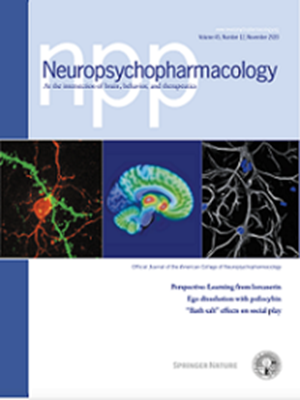Effects of methamphetamine on two measures of reward: Euphoria and neural activation to reward cues
IF 6.6
1区 医学
Q1 NEUROSCIENCES
引用次数: 0
Abstract
Stimulants enhance dopamine function, affecting diverse aspects of reward function from neural processing of reward cues to feelings of well-being in humans. However, little is known about the relationships among different measures of reward function. Understanding relationships among different indices of reward processing could provide insight into the processes that control motivated behavior. The present study examined the effects of a single dose of methamphetamine on two measures of reward in healthy adults: feelings of well-being and neural activation with reward-related stimuli. In a randomized, within-subject, double-blind study, 88 healthy men and women received a single 20 mg oral dose of methamphetamine (MA) and placebo, across two sessions. Regional activations to reward-related cues were assessed using fMRI during the Monetary Incentive Delay task, and positive subjective effects of MA were assessed using standardized questionnaires. As expected, MA increased euphoria and feelings of well-being. MA had minimal effects on neural activation during either anticipation or receipt of reward, but it significantly increased ventral striatal activation during anticipation of monetary loss, suggesting heightened salience of loss-related cues. As reported previously, caudate activation during reward anticipation during the non-drug (placebo) session was correlated with euphoria induced by MA (on the MA session). However, this correlation between cue-induced neural activation and euphoria was not apparent on the MA session. Thus, MA-induced euphoria was related to reward cue-elicited neural activation only when participants were tested without the drug. MA increased neural reactivity to loss, and this was not correlated with euphoria. These findings suggest that MA can dampen reward-related neural activity normally detected in the drug-free state, and that it enhances brain responses to loss. Further research is needed to determine how neural responses to reward or loss cues are related to feelings of well-being, and how either of these affect reward-related behavior.

甲基苯丙胺对两种奖励指标的影响:欣快感和对奖励线索的神经激活。
兴奋剂增强多巴胺的功能,影响奖励功能的各个方面,从奖励线索的神经处理到人类的幸福感。然而,人们对不同奖励功能测量之间的关系知之甚少。了解不同奖励加工指标之间的关系,有助于深入了解控制动机行为的过程。本研究考察了单剂量甲基苯丙胺对健康成人两项奖励指标的影响:幸福感和与奖励相关刺激的神经激活。在一项随机、受试者内、双盲研究中,88名健康男性和女性在两个疗程中接受单次20毫克口服甲基苯丙胺(MA)和安慰剂。在货币激励延迟任务中,使用功能磁共振成像评估对奖励相关线索的区域激活,并使用标准化问卷评估MA的积极主观效应。正如预期的那样,MA增加了欣快感和幸福感。MA在预期或接受奖励时对神经激活的影响很小,但在预期金钱损失时,它显著增加了腹侧纹状体的激活,表明损失相关线索的显著性增强。如前所述,在非药物(安慰剂)阶段,奖赏预期期间的尾状核激活与MA诱导的欣快感相关(在MA阶段)。然而,这种线索诱导的神经激活和欣快感之间的相关性在MA会话中并不明显。因此,ma诱导的欣快感与奖励线索引发的神经激活有关,只有当参与者在没有药物的情况下进行测试时。MA增加了神经对损失的反应,而这与欣快感无关。这些发现表明,MA可以抑制通常在无药状态下检测到的与奖励相关的神经活动,并增强大脑对损失的反应。需要进一步的研究来确定对奖励或损失线索的神经反应如何与幸福感相关,以及它们如何影响与奖励相关的行为。
本文章由计算机程序翻译,如有差异,请以英文原文为准。
求助全文
约1分钟内获得全文
求助全文
来源期刊

Neuropsychopharmacology
医学-精神病学
CiteScore
15.00
自引率
2.60%
发文量
240
审稿时长
2 months
期刊介绍:
Neuropsychopharmacology is a reputable international scientific journal that serves as the official publication of the American College of Neuropsychopharmacology (ACNP). The journal's primary focus is on research that enhances our knowledge of the brain and behavior, with a particular emphasis on the molecular, cellular, physiological, and psychological aspects of substances that affect the central nervous system (CNS). It also aims to identify new molecular targets for the development of future drugs.
The journal prioritizes original research reports, but it also welcomes mini-reviews and perspectives, which are often solicited by the editorial office. These types of articles provide valuable insights and syntheses of current research trends and future directions in the field of neuroscience and pharmacology.
 求助内容:
求助内容: 应助结果提醒方式:
应助结果提醒方式:


